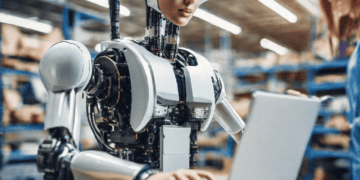Supply chains play a pivotal role in the global economy, serving as the complex network that facilitates the production, distribution, and delivery of goods. This intricate process relies on the collaboration of various stakeholders, including manufacturers, logistics providers, distributors, and retailers.
Recent disruptions in global supply chains have posed challenges to economies striving for recovery and revenue generation. Sectors like healthcare, hospitality, and automotive have grappled with these disruptions, exacerbated by factors such as the COVID-19 pandemic and shifts in the global economic landscape.
The emergence and ongoing refinement of artificial intelligence (AI) have brought about positive changes across various industries, and the application of AI in supply chain management (SCM) holds significant potential for optimizing key aspects of the global economy, such as material availability, monitoring, and transportation. Effective supply chain management relies heavily on accurate data logging and categorization.
Challenges in the Automotive Industry The automotive industry faced considerable delays in its supply chain due to disruptions in software-based vehicle chip production. A prominent manufacturer, General Motors, reported a 40% profit loss over a three-month period in 2022, necessitating adjustments to its production schedule. The global semiconductor supply chain, a crucial component for vehicle chip manufacturing, experienced interruptions as logistics and supply chain companies grappled with raw material shortages and labor constraints.
In 2021, the automotive industry incurred an estimated $210 billion in lost revenue due to chip supply chain shortages, leading to the production delays of numerous vehicle models.
Critical Issues in Healthcare The healthcare industry encountered ongoing product shortages in the wake of the pandemic, with around 93% of provider executives reporting such shortages, according to the Health Industry Distributors Association. Addressing these challenges necessitates innovative solutions that take a proactive approach to inventory management.
Disruptions in the Hospitality Sector Supply chain disruptions also adversely affected the hospitality industry. Hotels, for example, struggled to maintain the availability of essential supplies, impacting their revenue. These disruptions often translated into increased costs for consumers. Within the hospitality sector, the food and beverage component was particularly vulnerable to supply chain issues, resulting in limited menu options and customer dissatisfaction. Technological solutions, such as demand forecasting and inventory management optimization, can help mitigate these issues.
AI-Powered Solutions for Robust Supply Chains Traditional supply chain management methods, involving manual data input, have given way to streamlined approaches, bolstering the industry. Machine learning, a subset of AI, plays a pivotal role in processing vast datasets, enabling the forecast of future outcomes based on subtle data intricacies that may be overlooked by human observers. This data-driven approach empowers industry professionals to proactively address potential supply-demand imbalances, enhancing overall efficiency.
AI-driven SCM solutions have revolutionized inventory management, expediting product delivery and reducing consumer delays. For instance, in the automotive industry, these solutions enable dealerships to accurately track available inventory and efficiently manage the delivery of new vehicles to consumers. Inventory aggregation synchronization programs facilitate real-time stock data and replenishment across various channels and locations.
Recovery, Resilience, and Sustainable Practices Industry leaders and government authorities worldwide are actively seeking solutions to enhance supply chain resilience. Innovations, such as AI-powered algorithms that analyze transportation routes, load distribution, transportation costs, and delivery sequences, are streamlining the supply chain process and improving logistics efficiency.
Software developers are continually improving SCM protocols with AI-based resources to optimize production and data collection. These advancements empower decision-makers with data-driven insights and accurate forecasts. Collaborations with institutions like the USDA have led to enhanced AI and predictive analysis resources that improve crop yields and reduce farming expenses.
With ongoing government investments in supply chain management resources, the sector offers fertile ground for the development of new AI-powered technologies aimed at enhancing efficiency and global supply chain improvements.
Get the latest supply chain logistics news updates at The Supply Chain Report. Visit ADAMftd.com for free tools related to international trade.
#SupplyChainManagement #GlobalSupplyChain #AIDrivenSupplyChains #AutomotiveSupplyChain #HealthcareSupplyChain #HospitalitySupplyChain #AIinSCM #LogisticsChallenges #ChipShortage #AIForSupplyChain #SCMResilience #MachineLearningInSCM #DemandForecasting #InventoryOptimization #SupplyChainInnovation #SustainableSupplyChain #AIAndSupplyChainRecovery #USDA #AIinAgriculture
















